Saudi International Relations
The Saudi International Relations refer to the ties that connect the Kingdom of Saudi Arabia with countries around the world and international organizations, based on a foreign policy founded on principles established by King Abdulaziz Bin Abdulrahman Al Saud.
On September 19, 1932, a Royal Order was issued announcing the unification of Hejaz and Najd and its annexes under the name ‘the Kingdom of Saudi Arabia,’ effective from Thursday, September 23, 1932. This announcement marked the culmination of King Abdulaziz’s efforts to unify the Saudi state and establish its governance based on the principles of the Holy Quran and the Noble Prophetic Sunnah. It also signified the birth of a nation with its distinct mission and regional and international status.
Signing of the UN Charter by Saudi Arabia
Saudi Arabia was among the first countries to sign the United Nations Charter in 1945 and contributed to the founding of several international organizations, including the League of Arab States in 1945. Under King Abdulaziz's reign, Saudi Arabia gained significant international stature, joining many international organizations and ratifying numerous international agreements.
Principles of the Saudi international relations
Saudi Arabia has built its international relations on a balanced foreign policy grounded in principles that include good neighborliness, non-interference in the internal affairs of other countries, strengthening relationships that serve mutual interests, fostering cooperation with friendly nations, and playing an active role within regional and international organizations.
Saudi Arabia formulates and implements its foreign policy in alignment with its principles, ensuring the protection and promotion of national interests, safeguarding its citizens, contributing to security, and fostering the stability and prosperity of the region and the world.
The balance of Saudi international relations
Since its unification, Saudi Arabia has ensured a balance and equality in its international relations, particularly with major global powers with which it shares a network of interests, in line with its growing pivotal role in both the Arab and Islamic worlds. This approach has contributed to expanding Saudi Arabia's scope of action on the international stage.
Based on its regional and international weight and as one of the founding members of the United Nations in 1945, Saudi Arabia has played an effective role in achieving international peace in various regions of the world, as it is one of the objectives of its foreign policy. This has led it to continuously work within international partnerships for the sake of international peace and security, and to combat extremism and terrorism in all its forms.
There are many pillars upon which Saudi Arabia's foreign policy and its international role are founded. Promoting security and providing political support are among the core principles of Saudi Arabia's foreign policy, which has committed itself to non-interference in the internal affairs of other nations. This approach has made its role central in its regional context within the Arab and Islamic worlds and on the international stage, in addition to its special status in the hearts of all Muslims.
Contribution of Saudi Arabia's Kings to strengthening Saudi international relations
King Abdulaziz Bin Abdulrahman Al Saud
Since the unification of Saudi Arabia and its openness to the world, King Abdulaziz worked to strengthen Saudi Arabia's international standing. He sent envoys, received delegations from other countries, signed agreements, and contributed to the founding of several international organizations such as the United Nations and the League of Arab States. To further these foreign efforts, the General Directorate of Foreign Affairs was established in Makkah al-Mukarramah in 1926. Five years later, a Royal Order was issued to establish the Ministry of Foreign Affairs as the first ministry in Saudi Arabia.
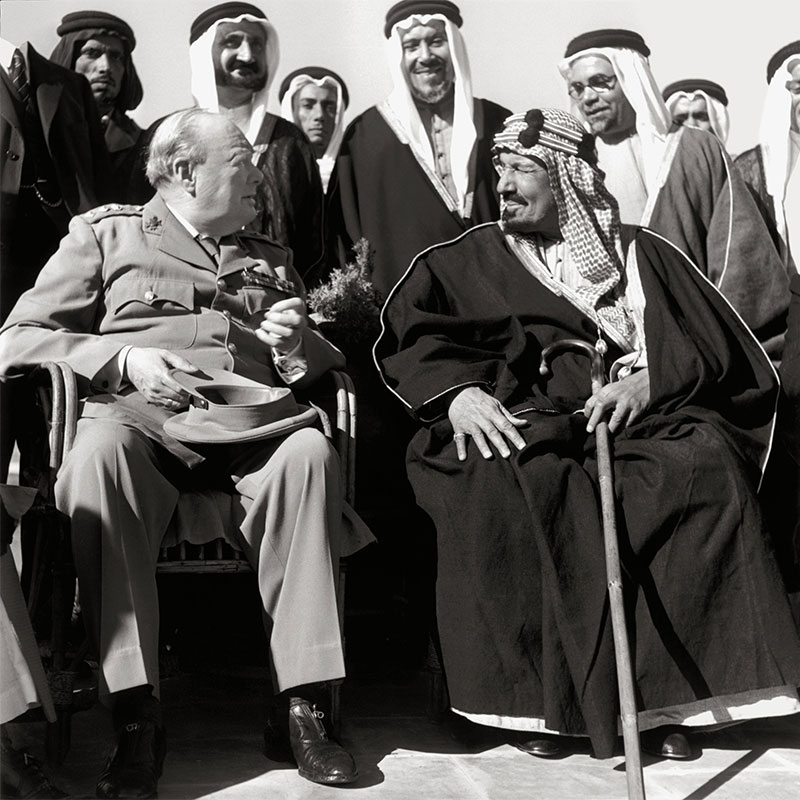
King Saud Bin Abdulaziz Al Saud
King Abdulaziz passed away on November 9, 1953, and his sons continued his approach to strengthening Saudi Arabia’s international relations through a balanced foreign policy. King Saud, the first of his sons to assume the throne between 1953 and 1964, undertook several foreign visits aimed at strengthening cooperation with neighboring and friendly nations. Arab and Islamic issues received special attention from King Saud.
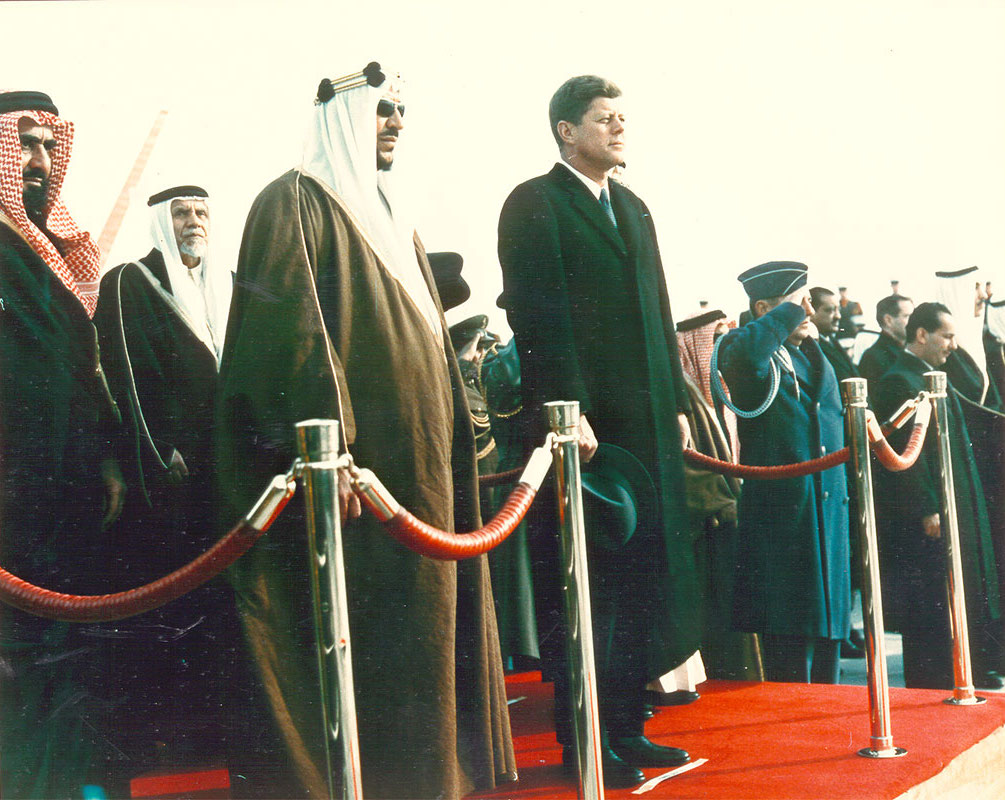
King Faisal Bin Abdulaziz Al Saud
In 1926, the Founding King Abdulaziz Bin Abdulrahman Al Saud established the General Directorate of Foreign Affairs in Makkah al-Mukarramah. In 1930, about two years before the unification of Saudi Arabia, King Abdulaziz issued a Royal Order to establish the Ministry of Foreign Affairs, appointing his son, Prince Faisal, as Saudi Arabia's first Foreign Minister, making it the oldest ministry in Saudi Arabia.
During the reign of King Faisal Bin Abdulaziz (1964–1975), Saudi Arabia's international standing was further strengthened, enabling it to preside over international meetings and Arab and Islamic summits, thanks to its global stature and noble mission. King Faisal successfully guided Arab and Islamic efforts, with Saudi Arabia taking the lead in confronting major global blocs and countering misleading ideologies.
King Faisal represented Saudi Arabia on its first official visit to the United Kingdom in October 1919 at the age of thirteen. He led Saudi Arabia's delegation at the London Conference (Round Table Conference) in 1939 to discuss the Palestinian cause, and headed Saudi Arabia's delegation at the founding conference of the United Nations in San Francisco, United States of America, in 1945.
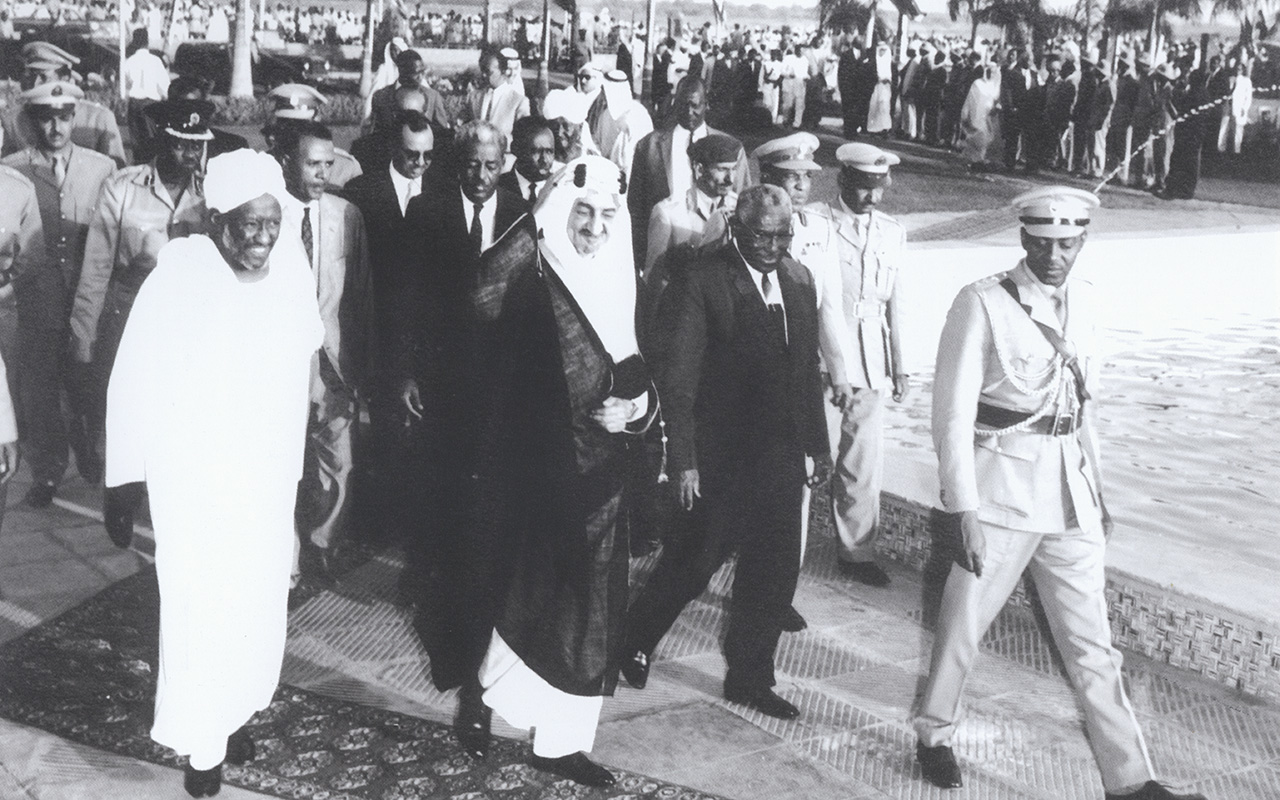
King Khalid Bin Abdulaziz Al Saud
King Khalid Bin Abdulaziz (1975–1982) continued to uphold Saudi Arabia’s leading role in Arab and Islamic policies, leveraging its firm principles and leadership as the land of the two holy mosques, which hold a special place in the hearts of Muslims.
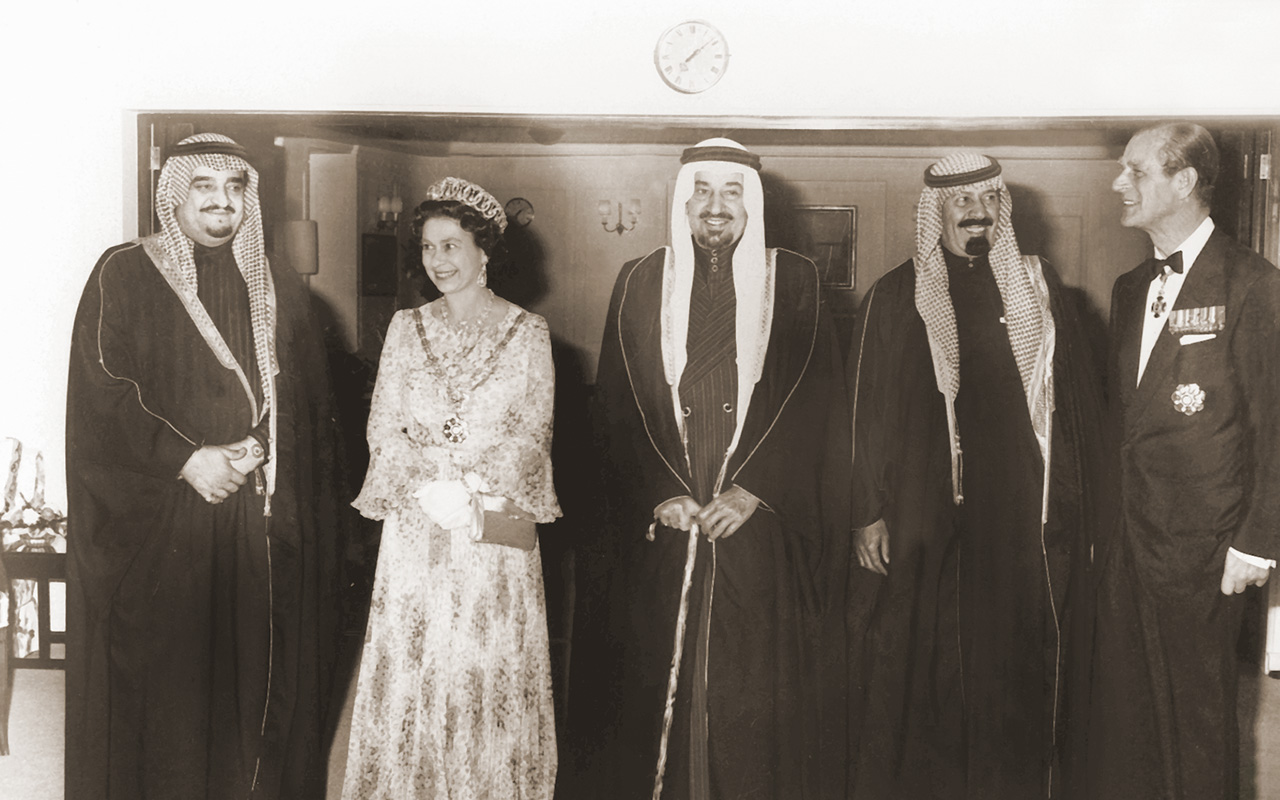
King Fahd Bin Abdulaziz Al Saud
The foreign policy during the reign of King Fahd Bin Abdulaziz (1982–2005) was characterized by realism and effectiveness. Thanks to the foreign policy pursued by King Fahd, Saudi Arabia was able to provide suitable solutions to many challenges faced by the Arab and Islamic nations.
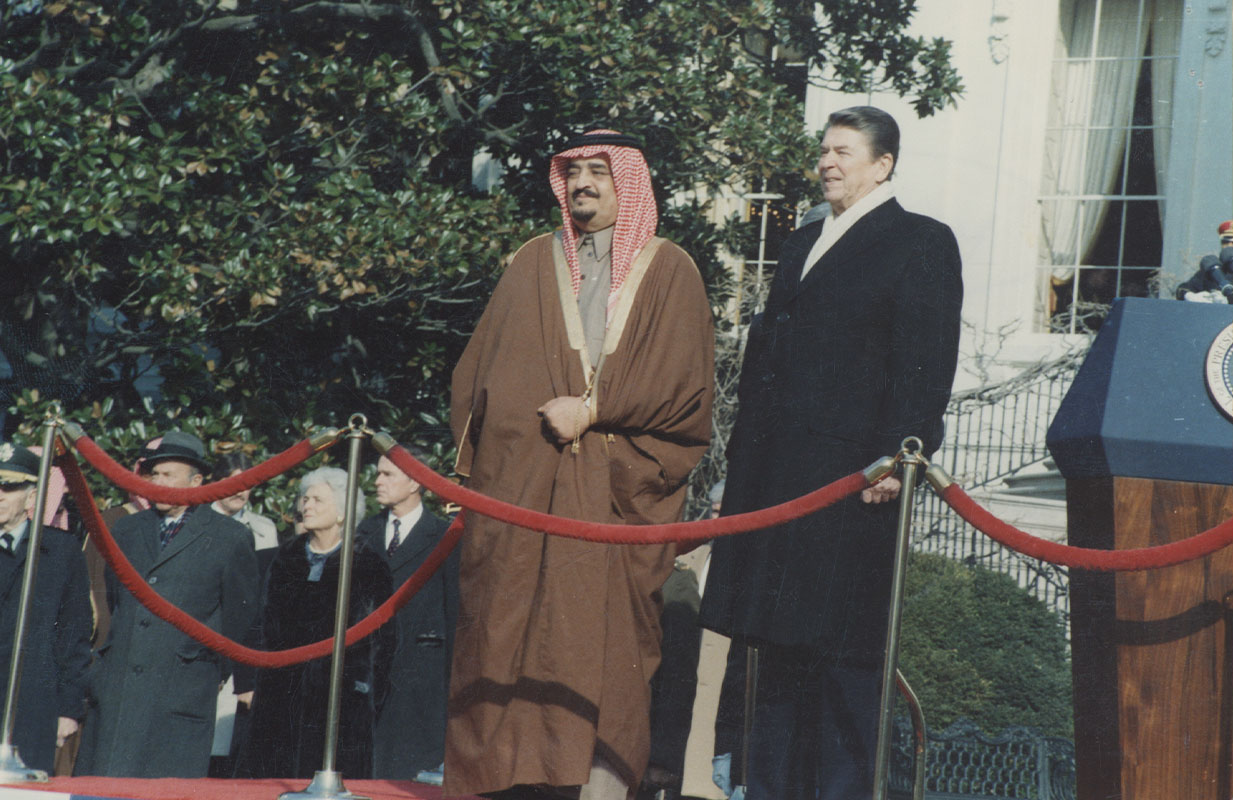
King Abdullah Bin Abdulaziz Al Saud
During King Abdullah Bin Abdulaziz’s rule (2005–2015), significant successes were achieved in strengthening Islamic solidarity. His foreign policy deepened the brotherly ties between Arab countries, resolved Arab disputes, and ensured Saudi Arabia's active role on the global economic map, particularly within the Organization of the Petroleum Exporting Countries (OPEC). Saudi Arabia’s position in the United Nations and the Non-Aligned Movement was further solidified during his reign.
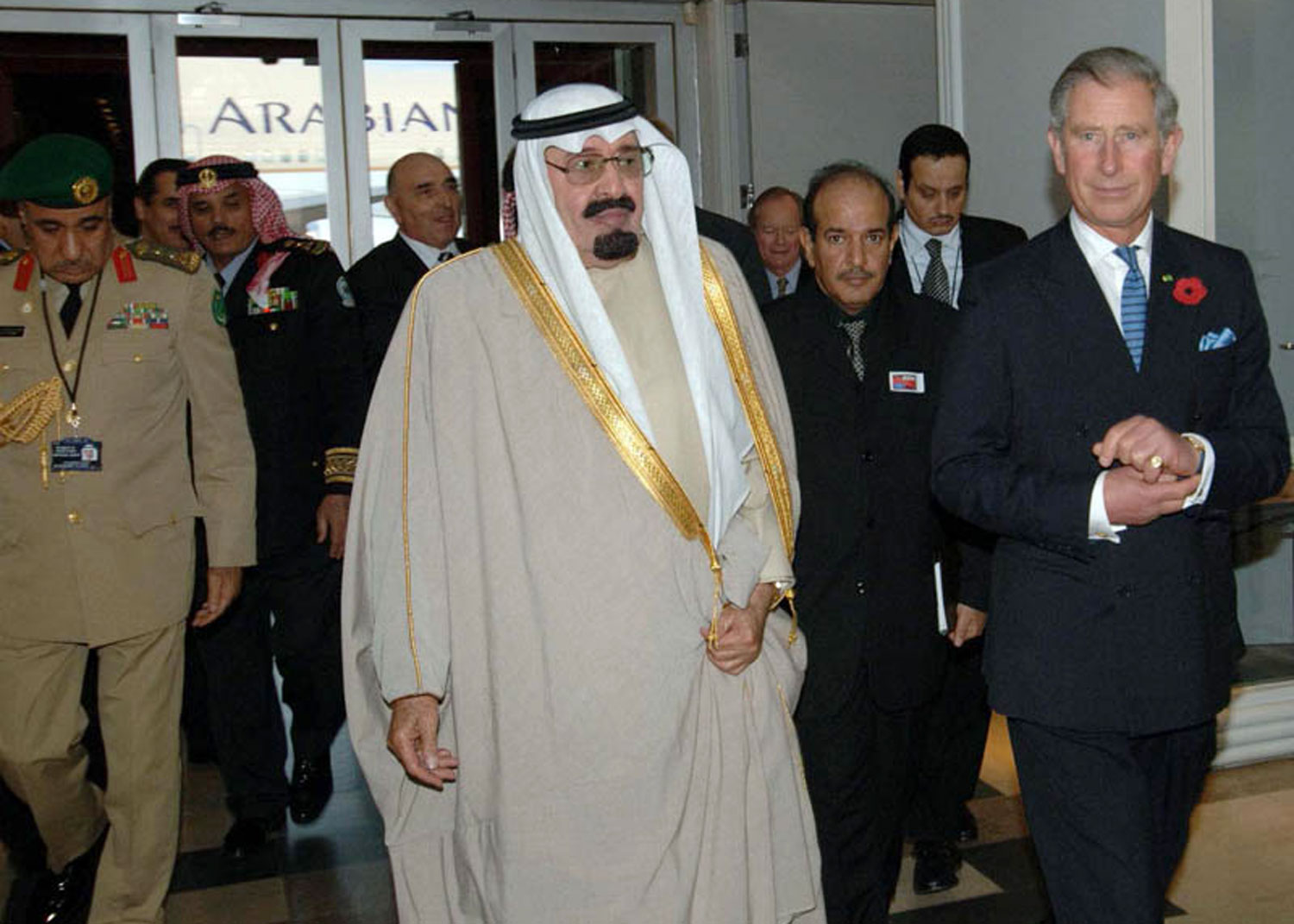
King Salman Bin Abdulaziz Al Saud
The outside world witnessed a new role played by Saudi Arabia under the rule of the Custodian of the Two Holy Mosques, King Salman Bin Abdulaziz Al Saud, who was pledged allegiance as King on January 23, 2015. During his reign, Saudi Arabia became known for its clear contribution to international humanitarian and relief efforts.
King Salman has championed humanitarian efforts since the early days of his career and his assumption of various responsibilities within the state, chairing numerous governmental and popular committees to aid victims in Egypt, Pakistan, Sudan, Bosnia and Herzegovina, and other countries.
The number of countries that benefited from the projects of the King Salman Humanitarian Aid and Relief Center reached ninety-eight countries, while the cost of these projects, both completed and under implementation as of December 31, 2023, amounted to about USD6,532,536,783. The number of projects that have been implemented and will be implemented in these ninety-eight countries has reached approximately 2,673 projects.
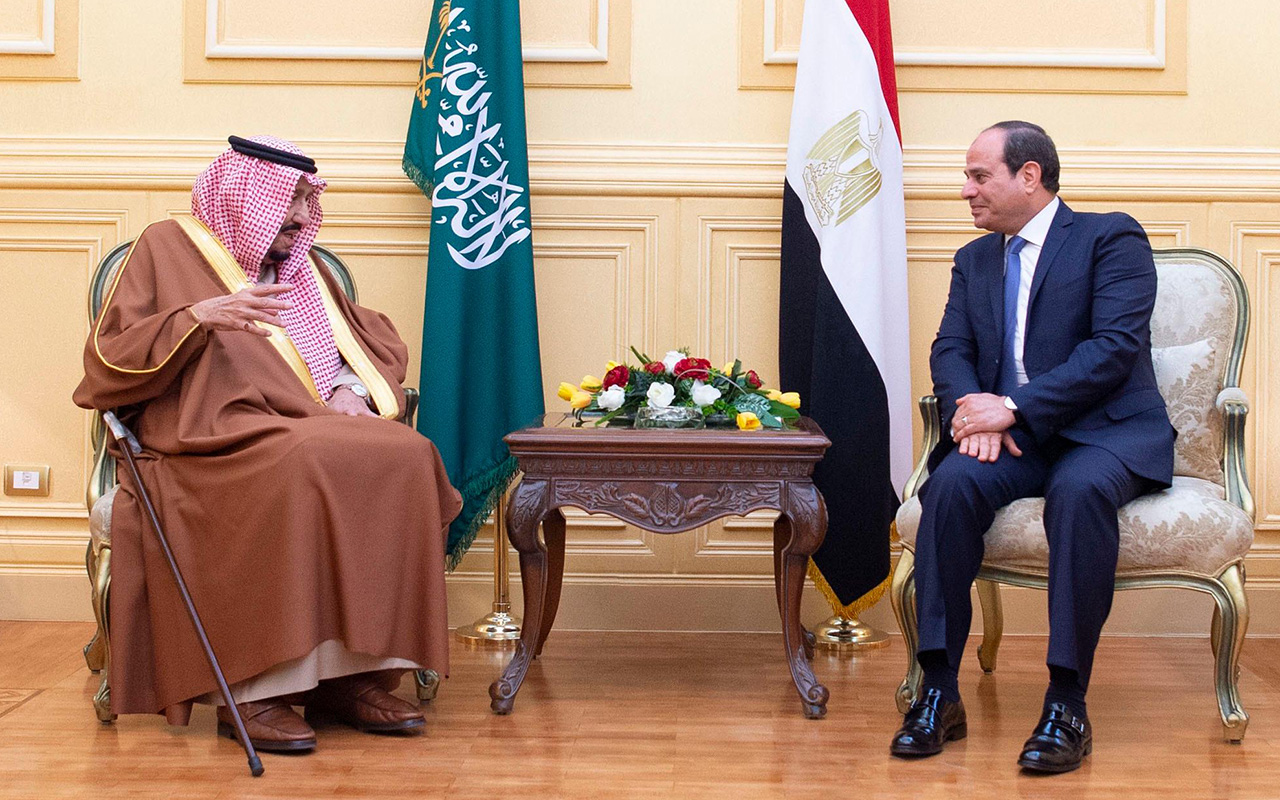
Prince Saud al-Faisal and Saudi diplomacy
Prince Saud al-Faisal (1940–2015) represents a symbol of Saudi diplomacy in particular, and Arab and Islamic diplomacy in general. He holds the record as the longest-serving foreign minister in the world (October 13, 1975 – April 29, 2015), having earned the trust of four kings: King Khalid Bin Abdulaziz Al Saud, King Fahd Bin Abdulaziz Al Saud, King Abdullah Bin Abdulaziz Al Saud, and the Custodian of the Two Holy Mosques King Salman Bin Abdulaziz Al Saud. The period of Prince Saud al-Faisal’s chairmanship of the Ministry of Foreign Affairs was also marked by prominent international events, at the level of the Middle East and the world.
Prince Saud al-Faisal made multiple efforts that contributed to activating the role of the Arab League, establishing the Gulf Cooperation Council (GCC), and defending the legitimate rights of the Palestinian people. Additionally, he played a crucial role in efforts to bring peace to Lebanon after years of conflict and in combating terrorism. During his tenure as foreign minister, Saudi Arabia’s foreign policy became more evident, particularly in its support for global peace efforts and the consolidation of regional security.
Saudi Arabia's role in maintaining international security
As a founding member of the United Nations, Saudi Arabia has worked to implement its programs and achieve its goals, including international security. Over the years, its efforts have been integral to global stability, peace, and the fight against terrorism. Since the emergence of al-Qaeda, Saudi Arabia has been combating the organization, starting with the first terrorist attack in 1995, which targeted a National Guard administrative building in Riyadh, prior to the September 11, 2001, attacks in the United States.
Thwarting the bombing of two cargo planes loaded with explosives, bound for American cities, by al-Qaeda operatives in Yemen in October 2010 was also one of the successes of the Saudi counter-terrorism program.
Saudi Arabia's regional role in global peace
Through its strong international relations and role in serving global peace, Saudi Arabia's efforts culminated in the announcement of the formation of the Islamic Military Counter Terrorism Coalition in December 2015. The coalition was established to combat terrorism and counter extremism, with support from friendly, peace-loving countries and international organizations. It aims to coordinate and unify efforts in intellectual and media fields, combat terrorism financing, and contribute effectively to international efforts to maintain global peace and security.
Saudi Arabia's efforts extend beyond achieving peace to also enhancing stability and prosperity for societies worldwide. This includes the Middle East region, especially the GCC states. Strengthening the unity of GCC countries, reinforcing their institutions, preserving the GCC system, and ensuring the prosperity of its states and the development of its peoples are among the concerns of the Saudi vision. This vision aims to transform the region, led by the leaders of the Gulf states, into a global hub of development and prosperity.
Humanitarian role of Saudi Arabia
Saudi Arabia continues its longstanding humanitarian role, providing aid without discrimination based on race or religion. This includes supporting countries affected by disasters and crises and adhering to the principles of humanitarian work. Saudi Arabia’s international humanitarian assistance began in 1950 with aid to flood victims in Punjab and includes the establishment of the Saudi Fund for Development in 1974 to stimulate economic growth in developing countries. Examples of this include organizing official and public donation campaigns for the victims of the Kosovo War in 1999, for victims of the Indian Ocean tsunami in 2004, and for victims of Cyclone Sidr in Bangladesh in 2007. Saudi Arabia also donated to victims of the 2008 China earthquake and, in the same year, made the largest donation in the history of the World Food Programme, amounting to USD500 million. Additionally, in 2014, Saudi Arabia contributed another USD500 million to assist displaced Iraqis.
Saudi Arabia’s humanitarian efforts have affirmed its role in international relations, which are based on respect. Between 1996 and 2018, Saudi Arabia’s foreign aid totaled more than USD86 billion, benefiting eighty-one countries. King Salman Humanitarian Aid and Relief Centre, established in 2015, works to be a leading center for relief and humanitarian efforts, sharing its values worldwide, and managing and coordinating relief efforts on an international scale.
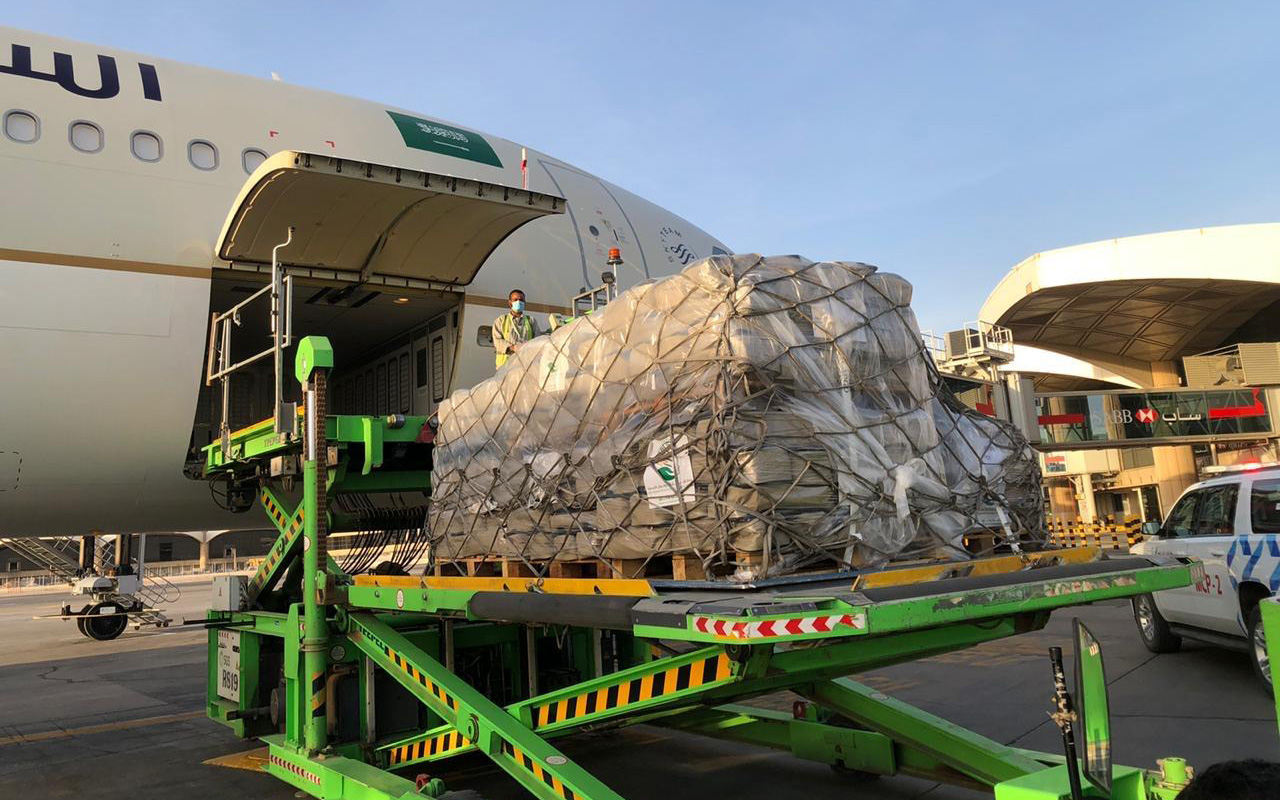
Role of national institutions in Saudi Arabia's international relations
Saudi Arabia has succeeded in building extensive international relationships through its national institutions, achieving its national interests, and enhancing its global influence in various fields. In this context, the Saudi Central Bank actively participates in meetings of many regional and international financial organizations and bodies, as well as technical committees and working groups affiliated with those organizations.
The Saudi Central Bank holds memberships in several key international bodies, including the International Monetary Fund (IMF), the World Bank Group, the G20, the Bank for International Settlements (BIS), the Financial Stability Board (FSB), the Financial Action Task Force (FATF), the Middle East and North Africa Financial Action Task Force (MENAFATF), the International Association of Insurance Supervisors (IAIS), the Islamic Financial Services Board (IFSB), the Accounting and Auditing Organization for Islamic Financial Institutions (AAOIFI), the Gulf Monetary Council, the Arab Monetary Fund, the Islamic Development Bank Group, and the International Association of Deposit Insurers.
Saudi Arabia's diplomatic missions
Saudi Arabia maintains extensive diplomatic relations with countries around the world. According to the ‘Global Diplomacy Index,’ which tracks diplomatic relations between countries, Saudi Arabia had 128 diplomatic missions worldwide in 2023, ranking twenty-fourth globally.
Saudi Arabia's relations with international organizations
Saudi Arabia has bolstered its vital international role through its membership in various United Nations organizations and committees, including the UN Country Team, the World Trade Organization (WTO), the Singapore Convention on Mediation, the UN Framework Convention on Climate Change, the UN Convention Against Illicit Traffic in Narcotic Drugs and Psychotropic Substances, the UN Convention on the Law of the Sea, and the UN Convention to Combat Desertification.
Saudi Arabia’s international agreements and cooperations also include the UN Convention Against Transnational Organized Crime, the UN Convention Against Corruption, UNESCO’s Convention on Measures to Prohibit and Prevent the Illicit Import, Export, and Transfer of Ownership of Cultural Property, UNESCO’s Convention on the Protection of the Underwater Cultural Heritage, membership in the International Association of Permanent Representatives to the United Nations, and the Intangible Cultural Heritage Committee at UNESCO.
Saudi Arabia has gained numerous international memberships across various sectors, providing it with flexibility on many key issues that support its evolving international relations. In 2018, Saudi Arabia was elected for the first time to UNESCO’s World Heritage Committee. Additionally, the United Nations World Tourism Organization (UNWTO) appointed Saudi Arabia’s nominee from the Saudi Commission for Tourism and National Heritage (now the Ministry of Tourism) as the Regional Director for the Middle East.
Saudi Arabia's membership in the International Labour Organization Governing Body
Saudi Arabia has added a new achievement to its international record by being elected as a full member of the Governing Body of the International Labour Organization (ILO) for the 2021-2024 term, representing the government group. This follows Saudi Arabia’s previous success as an alternate member during the 2017-2020 term, which was extended by an additional year due to the COVID-19 pandemic.
Saudi Arabia's support for regional and international institutions
On a regional level, Saudi Arabia contributes 20 percent of the resources to twelve Islamic institutions, including the Islamic Development Bank, the Arab Fund for Economic and Social Development, the Arab Monetary Fund, the Arab Bank for Economic Development in Africa, the OPEC Fund for International Development, and the Arab Gulf Program for United Nations Development Organizations. Saudi Arabia also plays a significant role in supporting international institutions focused on concessional development aid, such as the International Development Association, the International Fund for Agricultural Development, and the United Nations Development Programme. Additionally, Saudi Arabia has provided loans and financial facilities to the World Bank and the International Monetary Fund.
Saudi Arabia's international trade relations
Saudi Arabia’s accession to the World Trade Organization (WTO) in December 2005 marked a historic turning point for Saudi trade, becoming the 149th member. By March 2024, the WTO had grown to include 160 member states and twenty-four observers. Saudi Arabia chaired the WTO’s Trade Policy Review Body (for the 2023-2024 term), becoming the first Arab permanent representative to lead this body. Additionally, Saudi Arabia chairs the WTO Dispute Settlement Body (for the 2024-2025 term), and automatically assumes the chairmanship of the General Council, the highest authority in the WTO, (for the 2025-2026 term).
Saudi Arabia's trade relations encompass the export and import of goods worldwide. In 2022, export destinations for Saudi Arabia included China, India, Japan, South Korea, the United States of America, the United Arab Emirates, Egypt, Taiwan, Singapore, and Bahrain. Non-oil exports to these countries accounted for 66.2 percent of Saudi Arabia’s total exports.
On the import side, activity was robust in 2022, involving several countries, including China, the United States of America, the United Arab Emirates, India, Germany, Japan, Egypt, South Korea, Italy, and Switzerland. The total value of imports from these countries accounted for 61.2 percent of Saudi Arabia’s total imports.
In 2021, Saudi Arabia’s products achieved international spread, reaching more than 178 countries around the world.
Saudi Arabia’s exports experienced growth, reaching SAR1,021.3 billion in 2022 across the top ten countries, while the total value of imports from Saudi Arabia’s top ten trading partners amounted to SAR435.8 billion.
Saudi international relations according to Saudi Vision 2030
Under the leadership of the Custodian of the Two Holy Mosques, King Salman Bin Abdulaziz Al Saud, Saudi Arabia’s international relations have become more dynamic and open with the launch of Saudi Vision 2030. His Royal Highness, Crown Prince and Prime Minister Mohammed Bin Salman Bin Abdulaziz, emphasized that Saudi Arabia’s interests and foreign policy are firmly rooted in safeguarding its security and strategic partnerships, particularly with its regional allies, starting with the Gulf states, Arab nations, and the Middle Eastern countries, which remain its most important partners.
Contemporary Saudi foreign policy
Crown Prince Mohammed Bin Salman identified three pillars for the success of Saudi Vision 2030. The first is a blessed homeland, home to the Two Holy Mosques, the most sacred places on Earth, and the spiritual center for over a billion Muslims. Saudi Arabia also holds a deep-rooted Arab and Islamic identity. The second pillar is Saudi Arabia’s vast investment capabilities, attracting global interest. The third pillar for the success of the vision is Saudi Arabia’s strategic geographical location, serving as an important gateway to the world as it connects three continents and is surrounded by the most significant maritime passages.
Among the key principles of Saudi Arabia's contemporary foreign policy is the strengthening of alliances with partners worldwide, including the United States, the United Kingdom, and France. Saudi Arabia also seeks to establish new partnerships with various countries, such as Russia, India, China, and others, in order to advance its interests without causing harm to any other nation.
Saudi Arabia's international relations are evolving towards a new direction that focuses on advancing its supreme national interests in a way that benefits both itself and its partners, as well as international interests, while rejecting any pressure or interference in its internal affairs.
Examples of Saudi international relations
Saudi-Gulf relations
Saudi Arabia places great importance on the Arab Gulf countries, with a primary focus on the Gulf region, viewing it as the initial link in its external relations chain within its foreign policy framework. Relations with Arab Gulf countries are a top foreign policy priority for Saudi Arabia, based on the understanding that Saudi Arabia is fundamentally a Gulf state and is directly influenced by developments in the region. Therefore, from the outset, Saudi Arabia recognized the necessity of adopting a unified foreign policy for GCC countries, while working to serve the interests of their people.
Several factors have led Saudi Arabia to prioritize the Gulf in its foreign policy, including historical relations, familial ties, geographical proximity, and the shared belief among Saudi Arabia and other Gulf states in their commonalities. These factors contributed to the establishment of the GCC in 1981.
Saudi-American relations
The bilateral relations between Saudi Arabia and the United States date back to 1931, when the commercial exploration and production of oil began in Saudi Arabia, and King Abdulaziz granted an American company the right to explore. This was followed by the signing of a cooperation agreement on November 7, 1933. The historic meeting between King Abdulaziz and U.S. President Franklin Roosevelt aboard the US cruiser (USS Quincy) on February 14, 1945, laid the foundation for a strategic partnership based on mutual respect and trust.
Saudi Arabia's leadership role in the Arab and Islamic worlds, combined with its strategic location, has contributed to strengthening the bilateral relationship with the United States. It has also played a key role in maintaining stability, security, and prosperity in the Gulf and Middle East regions, as well as ongoing consultations on numerous regional and global issues of vital importance to both countries.
The world views the relationship between Saudi Arabia and the United States as a cornerstone for enhancing regional and global security and economy. Both countries play a pivotal role in efforts to promote international peace and security, given their political, security, and economic significance, as well as their membership in the G20. The United States has welcomed Saudi Arabia’s efforts to combat climate change, particularly the Middle East Green Initiative launched by Crown Prince Mohammed Bin Salman.
Economically, the two countries maintain strong relations, with approximately 742 American companies operating in Saudi Arabia across various sectors. Total American investment in Saudi Arabia amounts to SAR90.6 billion. As of 2022, there are about 21,034 American brands in the Saudi market.
In 2024, the volume of direct U.S. investment in Saudi Arabia reached approximately SAR57.3 billion, while the total trade exchange between the two countries amounted to around SAR120 billion. Saudi Arabia exported goods and products to the United States valued at SAR48.7 billion, compared to imports from the U.S. totaling SAR71.3 billion.
The strength of the economic ties between the two nations was reflected in the growth of trade exchange, which reached USD500 billion during the period from 2013 to 2024.
Coinciding with U.S. President Donald Trump’s visit to Saudi Arabia, on May 13, 2025, His Royal Highness Crown Prince and Prime Minister Mohammed bin Salman bin Abdulaziz and U.S. President Donald Trump signed the Strategic Economic Partnership Document between the Government of Saudi Arabia and the Government of the United States. The Crown Prince and the U.S. President also witnessed the exchange and announcement of several bilateral agreements and memorandums of cooperation.
Saudi Arabia and the United States also enjoy strong cultural and educational relations. In 2025, the number of Saudi students studying in the U.S. under the Custodian of the Two Holy Mosques Scholarship Program reached 14,845. Since its launch in 2006, the program has sent more than half a million Saudi students to study in the U.S. Meanwhile, the Saudi government has awarded 318 scholarships to American students, and the number of agreements, memorandums of cooperation, executive programs, and service contracts between Saudi and American universities has reached 289 agreements.
Saudi-European relations
Saudi Arabia's relationship with the European Union dates back to 1967, thirty-five years after the announcement of Saudi Arabia's unification. This relationship was driven by Saudi Arabia's foreign policy, which focuses on establishing ties that serve national interests and diversifying diplomatic connections with various countries, in line with the principles upon which Saudi Arabia is founded.
Saudi Arabia and the EU enjoy strong relations across many areas, with the EU being the most significant international organization after the UN due to its role in global affairs. The EU holds considerable influence in shaping international decisions, with France being one of its members and a permanent member of the UN Security Council.
Saudi Arabia and the EU have established permanent diplomatic missions in each other’s territories to deepen their relations. Both parties share similar perspectives on several key issues, including the Arab Peace Initiative for the Middle East, which was endorsed by the League of Arab States. Their strong relations were further solidified by the signing of a Cooperation Agreement between the European Commission and the GCC in 1989. Under this agreement, the foreign ministers of the EU and the GCC meet annually.
Saudi-Egyptian relations
The relationship between Saudi Arabia and Egypt dates back to 1902, thirty years before the announcement of Saudi Arabia's unification. The two countries signed a Friendship Treaty in 1926. King Abdulaziz's first diplomatic visit to Egypt was in 1946. This visit reflected Saudi Arabia's foreign policy, which focuses on establishing relationships that serve its national interests and diversifying diplomatic ties with countries around the world, in accordance with the principles upon which Saudi Arabia is founded.
The Saudi-Egyptian relations are distinguished by their deep historical roots and hold significant importance due to the strategic political and geographical positions both countries occupy on the Arab, Islamic, and international levels.
The relationship between the two countries has been strengthened by their shared heritage and common destiny. The leadership of both nations has consistently worked to maintain the same approaches and content, providing further elements of stability to this relationship, which draws on a legacy of political and diplomatic traditions established over many decades.
The Saudi Embassy building in Cairo is one of the largest embassy buildings globally, covering an area of 45,000 m². It integrates all Saudi consular services, diplomatic missions, and offices in a single location. The complex features an administrative tower with twenty-four floors, reaching a height of eighty-four m and topped with a helipad. Additionally, there is a residential tower for senior embassy staff and office directors, with seventeen floors and a height of sixty m. The public services building comprises two floors and occupies a substantial area within the embassy grounds.
Saudi-Indian relations
The trade relationship between Saudi Arabia and India is one of the most strategic bilateral partnerships for both nations. Both countries play a crucial role in global economic stability, being key members of the G20.
The trade volume between the two countries was valued at approximately SAR130 billion in 2019. Saudi Arabia is the fourth-largest trading partner for India, after China, the United States, and the United Arab Emirates. Additionally, Saudi Arabia is a major energy supplier for India, with India importing around 19 percent of its crude oil from Saudi Arabia.
In 2019, there were four hundred Indian companies operating in Saudi Arabia, while about forty Saudi companies were established in India.
The two countries share multifaceted relations that have resulted in agreements across several fields, including renewable energy, solar energy, information and communication technology, information security, space technology, sustainable development, arid land cultivation, desert ecology, urban development, healthcare, and biotechnology.
Saudi Arabia and India also share strong cultural ties, with the Indian community being one of the largest expatriate groups in Saudi Arabia. According to the 2022 Saudi Census, approximately 1,884,476 Indian residents live in Saudi Arabia, primarily working in the information technology and construction sectors.
Saudi Arabia's initiatives in resolving international crises
Saudi Arabia, through its foreign policy, has contributed to finding solutions to many issues on the Arab and Islamic levels. Saudi Arabia has played influential roles in various regional and international matters since the end of World War I. Saudi Arabia is one of the pioneering countries in maintaining regional security, with several initiatives, including:
Saudi Arabia's initiative on the Palestinian cause
The Palestinian cause has received significant attention from Saudi Arabia since its inception. Saudi Arabia has provided financial support and aid to the Palestine Liberation Organization (PLO). Building on this role, Saudi Arabia proposed a peace initiative at the Arab Summit in Beirut in 2002. This initiative was approved and adopted by the summit as the 'Arab Peace Initiative,' reflecting a collective Arab commitment to resolving the Arab-Israeli conflict.
Additionally, Saudi Arabia facilitated reconciliation between the Fatah and Hamas movements through the efforts of King Abdullah Bin Abdulaziz Al Saud, resulting in the Makkah Agreement among Palestinian factions in 2007. The agreement emphasized the sanctity of Palestinian blood and outlined measures and arrangements to prevent bloodshed, as well as the importance of forming a national unity government.
Saudi Arabia's initiative to resolve the Lebanese crisis
The brotherly relationship between Saudi Arabia and Lebanon dates back to 1922 when King Abdulaziz Bin Abdulrahman Al Saud met with the Lebanese writer and traveler Amin al-Rihani.
During the outbreak of the Lebanese Civil War in 1975, King Khalid Bin Abdulaziz Al Saud made significant efforts to contain the crisis, promoting Arab solidarity and unity.
Between 1975 and 1981, Saudi Arabia intervened several times to stop the conflict in Lebanon, either through individual initiatives or in collaboration with Arab efforts.
Saudi Arabia hosted the Arab Summit in Riyadh from October 17-18, 1976, which established the Arab Deterrent Force to restore stability to Lebanon, and contributed to it. Saudi Arabia also participated in the Beit Eddine Conference to address the escalating crisis in Lebanese-Syrian Christian relations. Additionally, Saudi Arabia was part of the Arab Quartet Committee to implement the resolutions of the Tunis Arab Summit on Lebanon (in November 20-22, 1979).
Under the initiative of King Fahd Bin Abdulaziz Al Saud, from September 30 to October 22, 1989, an extraordinary meeting of the Lebanese Parliament was held in Taif City, which resulted in the approval of the Lebanese National Reconciliation Document, known as the Taif Agreement.
Sources
King Faisal Center for Research and Islamic Studies.
The Federation of Saudi Chambers.
Intellectual dimensions in the strategic orientations of Saudi Arabia's Ministry of Foreign Affairs, Dr. Majed Bin Thamer Bin Thunayan Bin Muhammad Al Saud.
Foreign policy of Saudi Arabia. King Faisal Center for Research and Islamic Studies, Masarat Journal, November 2013 edition.
Saudi Arabia and Lebanon: Pre-Taif Diplomacy to End the Lebanese War. Abdulraouf Senno. Research and Studies at the Symposium on Saudi-Lebanese Relations during the reign of King Fahd Bin Abdulaziz Al Saud, held by King Abdulaziz Foundation in cooperation with the Lebanese University, Beirut, May 29-30, 2002.